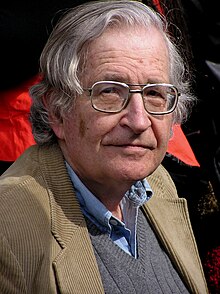Noam Chomsky
3. Language learned through exposure to our environment and our day to day interactions
ELLs when exposed to english language in class will slowly begin to pick up language from those around them including peers, teachers and other English-speakers
1. Theory that children are born with a hard wired syntax which gives them the ability to grasp ‘basic language’
Once basic language is formed, children eventually learn new vocabulary and apply learned syntax from this stage to form sentences
2. Language does not need to be taught
Living and learning in “natural environments” (an environment in which the child is exposed to the target language inside and outside of the classroom) will permit the student to naturally acquire the basics of language
4. Mainly All children become fluent in first language by the age of 6
This is also true for ELLs when learning a second language because it normally takes about 5 years for children to be at par with their classmates in terms of writing and speaking in the English language

"When we study human language,
we are approaching what some might
call the "human essence," the
distinctive qualities of mind that are,
so far as we know, unique to man."

"If you assume that there is no hope, you
guarantee that there will be no hope. If you assume that there is an instinct for freedom, that there are opportunities to change things, then there is a possibility that you can contribute to making a better world."
CRITICISM
LANGUAGE ACQUISITION DEVICE (LAD)
LANGUAGE DEVELOPMENT
1. Innate Knowledge
A) Chomsky claims we are all born with the ability to understand basic and complex language and grammar structures
B) Babies and infants experience the same language development processes, no matter the language they’re learning
C) This is the same for ELLs, just as they have the ability to learn the basics of their first language, this transfers over when learning a second language as well
2. Human language is a basic instinct
3. Humans are pre-wired to learn language
4. Universal Grammar
A) Humans learn language by observing and memorizing grammatical cues
B) All languages share the same grammatical building blocks
C) Children only need to learn certain parts of their language to understand syntax because the ability to learn grammar is hardwired into the human brain
CRITICAL PERIOD
1. Individuals acquire language most actively between birth and puberty
2. From 0-5 years, exposure to audio input is detrimental in the language learning process
3. Until the age of 13, language is present in both hemispheres of the brain
4. If language input does not occur until after puberty, language acquisition becomes more difficult, and the individual won’t be able to achieve a full range of language
1. Many critics say that his scientific method and evidence is not backed up by enough research
2. His ideas seem too simplistic/general
3. His theory doesn’t explain how individuals go from learning basic language to having grammatically correct adult-like speech

"The truth of the matter is that about 99 percent of teaching is making the students feel interested in the material. Then the other 1 percent has to do with your methods. And that's not just true of languages. It's true of every subject."

